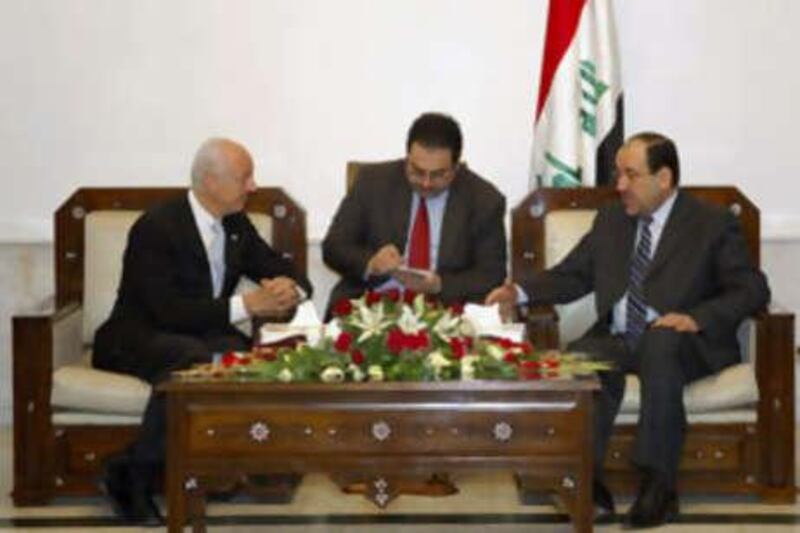BAGHDAD // Iraq's prime minister plans trips to the UAE and Europe this month, apparently hoping that improved security at home will lead to greater international support. Prime Minister Nouri al-Maliki will visit the United Arab Emirates on Sunday and then Germany and Italy later in July, said government spokesman, Ali al-Dabbagh, yesterday.
He did not give dates for the European stops, saying only that the visits will "enhance European-Iraqi co-operation and the mutual relations with these countries." Violence in Iraq has dropped to its lowest level in more than four years as a result of the build-up of American forces, the Sunni revolt against al Qa'eda in Iraq and Iraqi government clampdowns on Sunni extremists and Shiite militias. Mr Al-Maliki's government is hoping to capitalise on the downwards trend in violence to bolster Iraq's image internationally and shore up support for his Shiite-led administration.
Germany was a leading opponent of the 2003 US-led invasion that toppled Saddam Hussein, and Italy withdrew troops from Iraq in 2006 because of widespread public opposition to the war. Mr Al-Dabbagh also said Jordan's King Abdullah will visit Iraq soon. It would be the first visit to Baghdad by an Arab head of state since Saddam's regime collapsed. Iraq's ambassador to Jordan, Saad al-Hayyani, said preparations were under way for the visit but that no date has been set.
Jordanian officials declined to comment. Nevertheless, Mr al-Dabbagh said Iraq believed it "would stimulate other senior Arab officials to visit Iraq to enhance bilateral relations." He added: " I think this visit is the product of a different view of what is happening in Iraq." Iraq's mostly Sunni Arab neighbours have been wary of the Shiite-dominated government's ties to Iran. No Arab government currently has an ambassador in Baghdad, although several have promised to send one soon. Iran, by contrast, maintains an ambassador in Baghdad, and Iranian president Mahmoud Ahmadinejad visited Iraq last March.
The US hopes efforts to improve stability will receive a boost when Iraqi voters choose governing councils in the 18 provinces. The Americans hope the elections, expected this autumn, will increase Sunni participation in the political process and also bolster popular support for local administrations in Shiite areas. Many Sunnis boycotted the last provincial elections in January 2005, as did most followers of anti-American Shiite cleric Muqtada al-Sadr. Shiite religious parties won the major share of power in the balloting - a development which widened sectarian tensions.
Yesterday, the government banned political parties from using pictures of religious figures and non-candidates on posters and campaign material - a move clearly directed not only at al-Sadr's followers but also their head teacher Shiite rival, the Supreme Islamic Iraqi Council. The council rode to power in 2005 thanks to the endorsement of the country's most prominent Shiite cleric, Grand Ayatollah Ali al-Sistani, whose picture was plastered in Shiite areas across the country. Nevertheless, the Sadrists welcomed the government's announcement, presumably because it would prevent their main rivals from displaying pictures of al-Sistani. "We have been demanding the banning of such practices that would influence the voter's choice," said a senior al-Sadr official in the southern Shiite holy city of Najaf, speaking on condition of anonymity for security reasons.
But a leading figure in the Supreme Council, Latif al-Amidi, opposed the move, saying, "senior clerics and religious figures are our guidance in life and they are a source of power to us." He also criticised a government decision to ban campaigning in mosques and other places of worship. "We are Islamic parties and the mosques are the only places where we can meet our supporters and followers," al-Amidi said.
Yesterday, a car bombing killed four people and wounded 10 others near the morgue of Yarmouk hospital in western Baghdad, a police officer said, speaking on condition of anonymity. Car bomb attacks have dropped in the Iraqi capital after the launch of security operation by Iraqi forces. Police in Samarra reported finding a mass grave with 19 bodies in an area where al Qa'eda had been active. Last Saturday police found an estimated 30 human remains in an area west of Samarra, 95km north of Baghdad.
*AP





